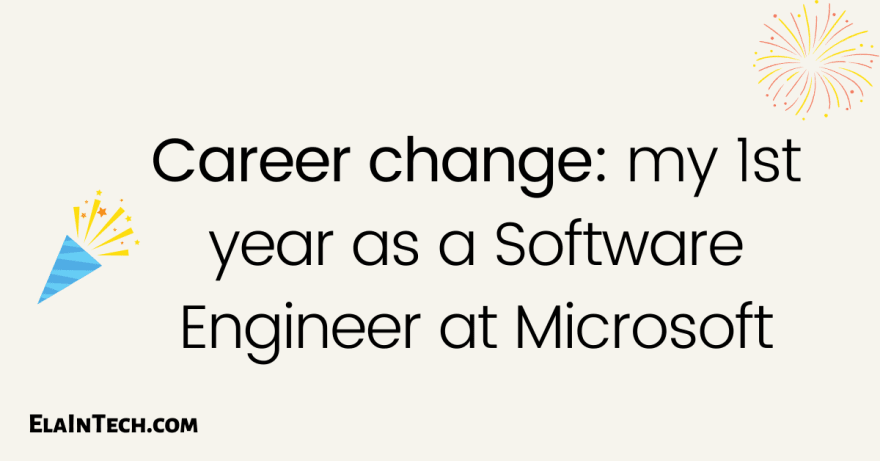Celebrating 7 years at Microsoft and my 1st year as a Software Engineer after the career change: from recruitment to software engineering role at ‘Microsoft Teams’ Prague team!
This post will be a mix of my thoughts/learnings from my 1st year as a Software Engineer at Microsoft: it is not about “I delivered x amount of features in XYZ areas” or “I had a chance to do this and that”. Quite the opposite: it’s a very personal post about what was happening with me, what challenges I was overcoming. And while I knew that changing my career won’t be easy, I think I didn’t expect some of the below to happen.
I don’t see many posts of what is really going ‘behind the scene’ with those who went through a career change this is why I’m sharing below. Hopefully, you can be better prepared and avoid some of the things I’ve experienced.
p.s. if you start thinking “Is she really happy about that career change?” then I can assure you that yes 🙂 !
p.s. 2 If you want to know more about my journey into software engineering, then please check this post. My review of 2020 can be found here. And here’s where you can read how my remote onboarding looked like.
This was definitely a year where (in some areas) I felt like I’m back to where I was 10 years ago when I was just starting my career in tech: lots of unknown, feeling ‘imposter syndrome’, questioning my skills (oh yes, once again) and asking myself “Can I really do it?” type of questions more than ever.
1. It’s okay to not feel okay
Changing my career & leaving my comfort zone, going through a remote onboarding, relocating to Prague with my family in the middle of the pandemic, getting used to new life, having both of my parents in the hospital (dealing with huge stress when I have found out that my father has some serious heart problems and had to go through small surgery/treatment to prevent further & more serious problems), deep-diving into software engineering (this time for real!), taking part in Microsoft Hackathon, participating in Bug Bash, getting familiar with ‘Microsoft Teams’ codebase, polishing my JavaScript/TypeScript/React skills, writing my first unit tests, learning about “Internationalization, localization and globalization” (this is part I’m working on), working on bugs and delivering some really important features, blogging, mentoring people… the list could probably go on an on.
And while all this is great as I see how much progress I’ve done in the past year, I forgot about a very important thing: to take care of myself. To simply stop, to take a break. I forgot that taking ‘days off’ in order to take care of a family relative or taking a ‘sick leave’ does not equal taking proper time off to relax.
I’m really grateful to my Manager, Hugh Eland (and also my previous Manager, Juraj Kapsiar), for their help and support – for giving me enough time to get back my mental health on the right track, and for truly caring about me as a team member.
2. “Ela, don’t worry, it’s gonna be OK“
I still remember the first time I saw the ‘Microsoft Teams’ codebase. Happiness and excitement ended with the moment when I looked at VS Code and started scrolling down through all those folders and files. And I was scrolling…and scrolling…and… I think the below gif perfectly captures my reaction:

My first thought: “Are they really sure I’m capable of working on a such big and complex project?”. My colleague from the team who was also my onboarding Buddy (and my mentor), Sergii Mykhailov, must have seen that expression on my face as he started calming me down: “Don’t worry, all will be fine”.
And that was true: Throughout the year I had many moments where I experienced the same type of feeling. And there was always someone from my team that I could talk to about it. No judgment. Always a lot of understanding & support.
3. Don’t try to learn it all at once, take it step by step
As a Mentor, I am always telling my mentees: “Whenever you’re stepping out of your comfort zone, whenever you’re learning something new, give yourself time and space. It’s impossible to know it all, take it step by step”.
The truth is: I knew what I should (and shouldn’t) be doing, I knew that I cannot put pressure on myself, and know everything from day one (or two). I knew it all because I am helping people who are going through a career change, want to build their personal brand online, or need help with career development. But somehow, the “I knew it” wasn’t working for me for quite some time.
I’ve recently met with one of my colleagues from Microsoft’s Engineering Recruitment team and we both agreed that it’s so much easier to help others, advise them, boost their morale, but when it comes to ourselves, we’re our “worst advisors” – we know what we shouldn’t be doing, yet we end up doing it. And it takes a lot of time/conversations to stop it.
4. Knock, knock, it’s me, your imposter syndrome
Being in recruitment for so many years, knowing what to do, always having plan A to Z ready, growing others, being one of very senior Talent Sourcers and experienced member of the engineering recruitment team. To be honest I couldn’t even remember when was the last time I felt imposter syndrome. I think I forgot how it feels.
And that strange feeling became my ‘best friend’ from almost week 1 in my new role. I couldn’t deal with it for a few months – whenever I felt like I know something, then another task/new feature/new area was coming and I was back to feeling “stupid”, “not knowing how to code”, “not knowing anything”.
I overcame it with many conversations and pair programming: talking with my Manager, colleagues about how I feel, looking at how they code, tackle the problems, solve tasks has helped me a lot! Remember, people don’t have a crystal ball, can’t read minds, and won’t be able to help you if you don’t tell them about how you feel.
5. You’re not starting from scratch
Something that I had to remind myself over and over again: while I did a career change and started working in a completely new area I’m not starting from scratch. In fact, I’m adding another type of skills (in my case those are tech ones) to what I already know and learned while working in tech recruitment.
I’m really curious to see where it will bring me 🙂
6. Finding my rhythm in a new role
This was probably one of the hardest things: something that takes years to develop can’t be undone overnight. Recruitment has completely different working pace which I got used to. When I switched into a software engineering role I kind of thought that what worked there would also be useful here or that it will come naturally.
Unfortunately, it didn’t and I’ve struggled a lot until I realized that I had to stop working like I was used to for so many years and find a new rhythm. I’m still learning what works best for me, but I’m definitely on a good path.
7. “Why you’re not celebrating?”
I had a chat with one of my Mentors some time ago. We were talking about how it’s going, how I’m feeling, do I enjoy being a Software Engineer and how do I like my new life in Prague. At some point, he asked me: “Ela, I see something is happening. Look how much you’ve accomplished, look where you are. You should be proud! So why don’t you celebrate?“
That was the first time someone has asked me this question and it really hit me. Because it was so true: I was so into ‘learning mode’, dealing with pandemic and all personal stuff that I completely forgot to celebrate. I had to hear that from someone else to realize that instead of feeling proud, happy, and enjoying my work, I was focusing my time&energy on what I still don’t know and what I need to learn.
From that moment on I promised myself that I’ll be celebrating all my wins, no matter how small they might be. My tip: Write down in your notebook all things you’ve learned on that particular day/week/month – you might be surprised how much you already know!
8. What you bring to the team
It’s important to realize that each and every one of us is unique and brings different perspectives. You might not be the most senior person in the room, you might have a non-traditional career path, but it shouldn’t stop you from sharing your ideas. The experience you’re bringing from your previous job/role can help you look at things from a different angle and notice things others won’t see/think about.
Thanks for reading & have a nice day,
Ela
————-
Connect with me: LinkedIn, Twitter, Instagram



Latest comments (0)